
views
Best Types of Magnesium for Sleep
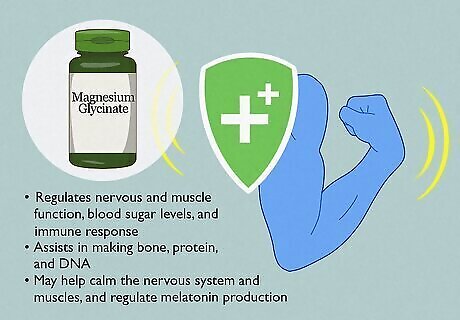
Magnesium glycinate Magnesium glycinate combines magnesium with the amino acid glycine. It helps regulate your nervous and muscle function, blood sugar levels, and immune response while assisting in making bone, protein, and DNA. New research suggests it can also benefit your sleep. It’s thought to calm your nervous system and muscles and regulate melatonin production, helping you to relax and get ready for sleep.
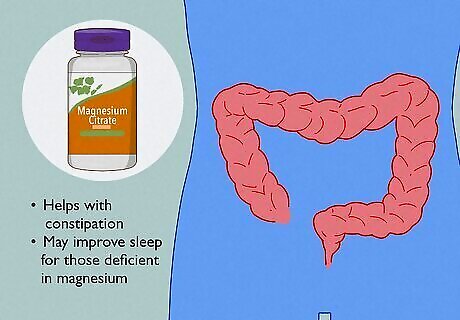
Magnesium citrate Magnesium citrate is a salt supplement that combines magnesium with elements of citric acid. While it’s widely used as a laxative to help with constipation, some recent studies show it also has a positive impact on sleep, particularly if you’re already deficient in magnesium. More research is needed to confirm its full effects, but early results are promising.
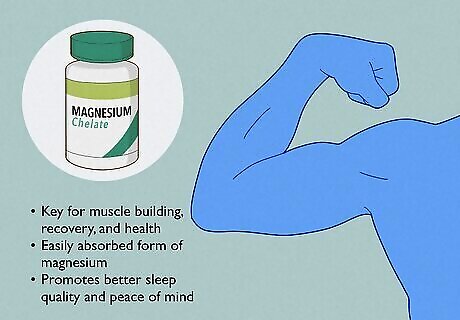
Magnesium chelate This form of magnesium is especially important for muscle building, recovery, and health. It’s an easily absorbed form of magnesium that’s attached to organic molecules, and studies show it promotes better sleep quality, fewer disturbances while you’re asleep, and peace of mind.
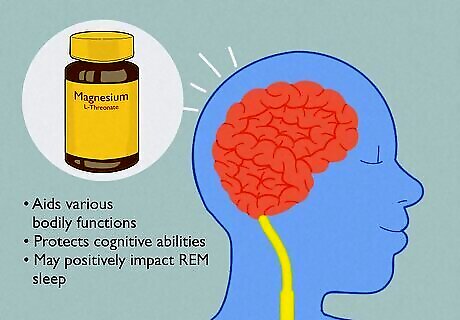
Magnesium L-threonate This supplement combines magnesium and the amino acid L-threonine. In addition to aiding various bodily functions, it’s also commonly purported to enhance or protect cognitive abilities. New studies show it may positively impact REM sleep during the night, helping make you more alert during the day.
How to Take Magnesium for Sleep

Consult with your doctor before taking a new magnesium supplement. Always consult a trusted physician before starting any new supplements, including magnesium. They’ll have insight on whether magnesium will interact poorly with any medications you’re on or if you have an underlying condition that doesn’t mix well with magnesium supplements, like certain heart or kidney diseases.

Buy a supplement with high bioavailability from a reputable seller. Bioavailability refers to how well a supplement can be absorbed through the gut and into your organs. For a magnesium supplement to help with sleep, it has to have high bioavailability. Generally, organic forms of magnesium (like glycinate or citrate) are easier for the body to absorb, while other forms (oxide, sulfate, and carbonate) have low absorption and may be less useful for sleep (and more prone to digestive side effects). Since supplements aren’t regulated by the FDA, look for a seller that includes third-party testing as part of their process. For example, all of BIOptimizers' products, including the best-selling Magnesium Breakthrough supplement, are tested by Informed Sport for 250+ substances that are prohibited in sports. The Informed Sport certification on the packaging ensures every product was made in an environment with quality systems appropriate for sports nutrition manufacturing.

Try the recommended daily allowance (about 310-420 mg) 1 hour before bed. It’s best to start with a small amount of magnesium (no more than the daily recommended allowance) to see how it affects you, then work up to a higher dosage if needed. The exact daily allowance depends on factors like your age, gender, and if you’re pregnant, but in general, adult males need 400-420 mg per day and adult females need 310-320 mg per day. Taking magnesium about 1 hour before bed gives the supplement enough time to kick in for most people, but experiment with what time feels best to you. For most people, it’s safe to take magnesium every day as long as you don’t exceed about 400 mg per dose. You may experience mild side effects like diarrhea or digestive discomfort if the dose is too high. If you have a magnesium deficiency, a doctor may recommend a higher dose temporarily to correct your imbalance. It’s estimated that about 48% of the population is magnesium deficient. Whether you have a deficiency or not, the key to finding the right dose is to start small and gradually raise the amount until you reach the ideal dose without digestive upset.

Try making a “sleepy girl mocktail” with magnesium as part of your bedtime routine. You may have heard of this viral health hack on social media, but this trendy drink may have real benefits for your sleep. The drink combines 1 tablespoon (15 g) of magnesium powder, ½ cup (118 mL) of pure tart cherry juice, and a fizzy drink like carbonated water or a prebiotic soda to cut it. While it’s not meant to be a magic bullet for sleep, many people claim it helps them get a better night’s sleep. Tart cherry juice contains natural melatonin (the “sleepy hormone”) and an amino acid called tryptophan (the same thing in turkey that makes you feel sleepy after Thanksgiving). When tart cherry juice combines with the muscle and nerve relaxation of magnesium (usually magnesium glycinate), the result is a “mocktail” that eases you into sleep. BIOptimizers’ tart cherry Magnesium Breakthrough powdered supplement is a great natural, vegetarian option for making a sleepy girl mocktail, and it contains 8 different types of magnesium and tart cherry juice powder. Clinically, tart cherry juice significantly increases time in bed, total sleep time, and sleep efficiency, making it an excellent synergy with magnesium for sleep. BIOptimizers' Magnesium Breakthrough Tart Cherry stands out due to its drinkable format, which is absorbed better than capsules. Plus, it tastes really good!
Try BIOptimizers’ Magnesium Breakthrough Supplement

Magnesium Breakthrough stands out in a crowded supplement market. It’s hard to know which supplement to choose with so many options available. Magnesium Breakthrough provides 500 mg of the seven most bioavailable forms of elemental magnesium in two reasonably-sized capsules. This makes it a great, effective option for sleep. It promotes a balanced stress response, helping you feel relaxed and at peace, and also provides key nutrients for a healthy immune response as well as an essential electrolyte to maintain a healthy circadian rhythm. Here are the stats: 7 types of best-absorbed organic forms of magnesium 250 mg elemental magnesium per capsule, 500 mg magnesium per 2-capsule serving 325 mg per scoop of Magnesium Breakthrough powder drink Includes cofactors that help magnesium absorption Vitamin B6 and manganese synergize with magnesium in sleep pathways Tart Cherry flavor incorporates 1000 mg of organic tart cherry powder per serving If you’re interested, you can get 15% off when buying a bundle of 3, 20% off for a bundle of 5, or 12% off when opting for the Subscribe 'N Save plan. BIOptimizers offers free shipping within US on orders $90+.
How do magnesium supplements work?

Magnesium is a mineral that supports a wide variety of bodily functions. It aids in muscle function and digestion, promotes heart health, and can relieve tension in your muscular and nervous systems. Many people get the recommended daily amount of magnesium through their diet from foods like nuts, seeds, greens, beans, fruits, and grains. Magnesium deficiencies may be caused by gastrointestinal issues that limit how much of the mineral your body can absorb.

Some supplements add cofactors to increase magnesium’s impact on the body. For example, fulvic or humic acid can improve mineral absorption, whereas balancing minerals like manganese may also help with sleep. Studies also show that vitamin B6 synergizes with magnesium to improve mood and relaxation, partly because vitamin B6 is a key cofactor in Gamma-Aminobutyric acid (GABA), serotonin, and melatonin biosynthesis.
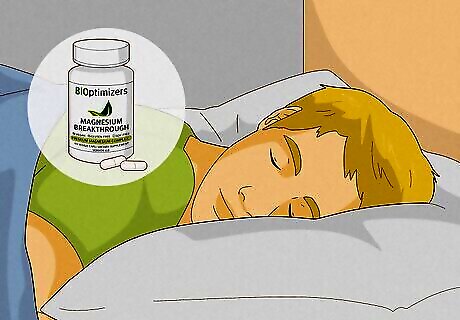
Getting enough elemental magnesium in each dose is crucial for sleep. Most organic forms of magnesium have about 7-20% of elemental magnesium because the amino or organic acids have a lot of weight relative to the magnesium. Therefore, you may need to take a lot of magnesium supplements. If you take one 200 mg capsule of magnesium glycinate, for example, you have only 28.2 mg of elemental magnesium. Therefore, you need 15 capsules of magnesium glycinate to get the RDA dose. Magnesium Breakthrough packs an impressive 250 mg of elemental magnesium per capsule (or 500 mg magnesium per 2-capsule serving), making it easy to get the dosage you need to reap magnesium’s health benefits.
Possible Side Effects from Magnesium

Diarrhea and digestive discomfort are the most common side effects of magnesium. Excess magnesium from food is passed out of the body through urine and stool, but an excess from medications or supplements (especially low-absorbing magnesium carbonate, chloride, gluconate, and oxide) can cause diarrhea, abdominal cramping, and nausea. Other, less common side effects may include drowsiness, low blood pressure, or muscle weakness.
Magnesium vs. Melatonin

Magnesium is a natural mineral, while melatonin is a hormone made in the brain. While they can both aid sleep, melatonin has a more specific function. Production increases when it gets dark, prompting your body to feel sleepy and want to go to bed. Melatonin is often used to reset your circadian rhythm (your internal 24-hour sleep-wake cycle), especially if you’re experiencing jet lag, occasional sleep issues, or simply need to change your bed and wake-up times. Magnesium, on the other hand, is more of a background mineral that helps in lots of different processes that may aid sleep, like muscle relaxation.
Magnesium-Rich Foods

Magnesium is found in lots of foods you probably consume most days. To get your daily recommended amount, you need about 5 servings of fruits and vegetables, 3 servings of whole grains, ¼ cup (1 ounce) of nuts or seeds, and 1 serving of legumes most days of the week. If you’re looking to up your dietary magnesium, consider eating more: Nuts and seeds (almonds, cashews, flaxseed, peanuts, pumpkin seeds, chia seeds) Legumes (black beans, edamame, lima beans) Fiber-rich whole grains (quinoa, shredded wheat) Low-fat dairy products (skim milk, yogurt) Greens (spinach, Swiss chard, collard greens) Fruit (avocados, bananas, papayas, blackberries) Vegetables (green peas, sweet corn, potatoes) Dark chocolate Mineral water
Who should try magnesium supplements?

Those with a magnesium deficiency benefit the most from taking supplements. Most people get enough magnesium from their diet, but certain groups of people are more at risk for a deficiency, including: Older adults Those with type 2 diabetes Those with gastrointestinal disorders Those with alcohol misuse disorder Keep in mind that magnesium supplements do not treat any diseases—they correct a magnesium deficiency, which can be very beneficial for overall health.
Other Forms of Magnesium
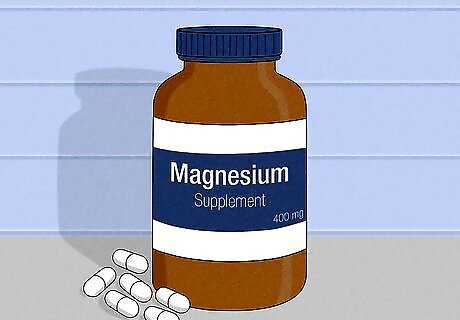
Other forms of magnesium supplements help your body differently. While glycinate, citrate, and L-threonate may help you sleep, other supplement types can be beneficial in other areas: Magnesium oxide is the most commonly used in supplements. It’s poorly absorbed by the body and can cause an upset stomach, so it’s not often recommended. Magnesium malate is easily absorbed, has a smaller laxative effect, and helps with physical discomfort. Magnesium taurate has natural calming effects, is easily absorbed, and can help regulate blood sugar and blood pressure. Magnesium orotate supports heart health, may help with constipation, and is easily absorbed by the gut.




















Comments
0 comment